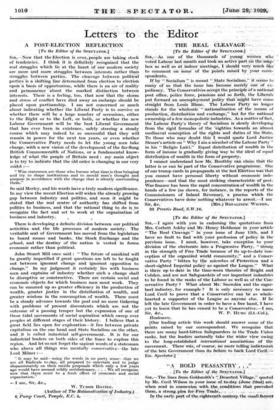Letters to the Editor
A POST-ELECTION REFLECTION [To the Editor of the SPEc-rAToa.] SIR,—Now that the Election is over, peOple are taking stock of tendencieS. I think it is definitely recognized that the real struggles which lie at the heart of our modern society are more and more struggles between -interests rather than struggles hetimen parties. The cleavage between political parties is a iihiffing line- determined from election to election . -
upon a basis of opportunism, while there is an air of reality
and permanence -about the marked distinction between interests. There is a feeling, too, that now that the storm and stress of conflict have died away an embargo should be placed upon partisanship. I am not concerned so much about indicating whether the Liberal Party is to survive or whether there will be a large number of secessions, either to the Right or to the Left, or both, or whether the new Labour Government will be the best Liberal Government that has ever been in existence, safely steering a steady course which may indeed be so successful that they will remain in power for the next ten years, or even whether the Conservative Party needs -to let the young men take charge, with a-new vision of the development of the far-flung British Commonwealth of Nations, or a fundamental know- ledge of what the people of Britain need : my main object is to try to indicate that the old order is Changing in our very midst :-- •- " Wise statesmen are those who foresee what time is thus bringing- and -fry in shape institutions and to mould men's thought and purpose n aceordance with the change that is silently surrounding
them.' "
So said Morley, and his words have a truly modern significance. In my view.the recent Election will widen the already growing gap between industry and politics, and soon it might be stated that the real centre of authority has shifted from politics to business, and that the rational thing to do is to recognize the fact and set- to work at the organization of
business and industry. _
There is developing a definite division between our political activities and the life processes of modern society. The veritable seat of Government has moved from the legislature to board rooms and banks; the Stock- Exchange and the school, and 'the destiny of the nation is vested in forms
economic rather than political. .•
John Stuart Mill once said : " The future of mankind will be greatly imperilled if great' questions are left to be fought out between ignorant change and ignorant opposition to change," In my jridgment it certainly lies with business men and captains of industry whether such a change shall be disruptive or constructive. There are certain social and eeonomic objects ,for which business men must work. They can be summed up as greater efficiency in the production Of wealth, greater justice in the distribution of wealth, and greater wisdom in the consumption. of. wealth. There must be a steady advance towards the goal and no mere tinkering with problems of present discontents which are not the outcome of a passing temper but the expression of one of those tidal movements of social aspiration which sweep over peoples at different stages of their history. I believe that a great field lies open for exploration—it lies between private capitalism on the one hand and State Socialism on the other, and it is called industrial self-government. _ It is for our industrial leaders. on both sides of the fence to explore this region. And let us not forget the sapient Words, of a statesman who above all things was mentally conservative—the late
Lord Milner :— .
It may be said—using the words in no party sense--that we are all Radicals to-day, all prepared 'to entertain and to judge dispassionately on their merits proposals which only a few years ago would have seemed wildly revolutionary... . We all reddsidie now that there must be a fresh effort of economic and social
—I am, Sir,:&c.,
. W. TrPOR DAvIES.
(Author of The Rationalizatiotrof Industry.)... B. Pump Court, Temple, E C 4. ,








































 Previous page
Previous page